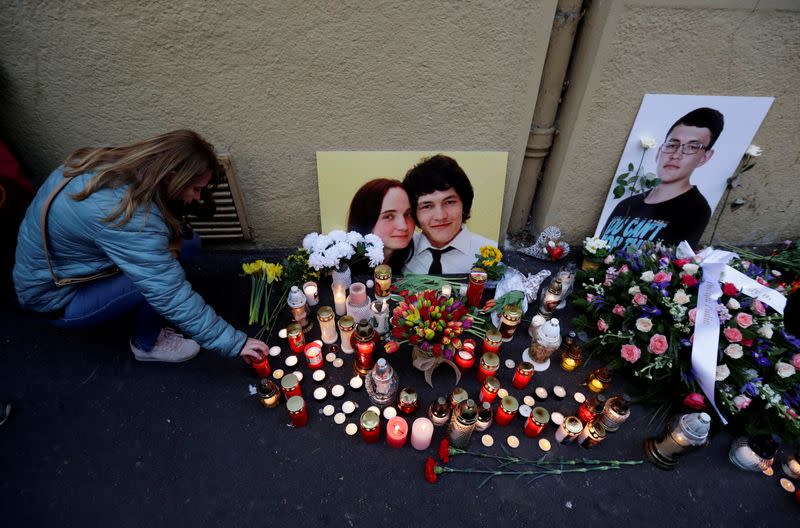Trial over Slovak journalist's murder puts justice system to test

By Tatiana Jancarikova
BRATISLAVA (Reuters) - The trial opens on Thursday of a businessman and three others charged over the murder of an investigative journalist and his fiancee in what is seen as a test of Slovakia's judicial and political system ahead of an election in February.
The February 2018 murder of Jan Kuciak and Martina Kusnirova prompted mass demonstrations against corruption that forced the resignation of then prime minister Robert Fico, and the case has dominated Slovakia's civic life since.
Kuciak, 27, and Kusnirova were gunned down in their house outside the capital Bratislava. The killing echoed the murder four months earlier of another journalist investigating corruption in an EU country, Daphne Caruana Galizia, who was killed in Malta.
Prosecutors say entrepreneur Marian Kocner, the subject of Kuciak's reporting on corruption, had contracted his killing.
Kocner and two alleged accomplices have pleaded not guilty while the fourth suspect has confessed to the shooting, according to public television RTVS, quoting police sources. They face up to life in prison if convicted.
A fifth man has confessed to facilitating the killing and has made a plea deal with prosecutors to act as a witness.
At the Thursday preliminary hearing, judges will either set the date for the main hearing or ask prosecutors for additional evidence.
The case is seen as a test of Slovak police and judicial independence after the investigation exposed business and personal links between Kocner and security officials.
Grigorij Meseznikov from the Bratislava-based Institute for Public Affairs told Reuters: "The trial will be closely watched at home and abroad by people hoping for closure of events started by murders that triggered protests that led to resignations, including the prime minister, interior minister and police chief."
"The trial may wrap up the procedural part of the process but Slovaks will seek the symbolic closure of an era that allowed Kocner to grow so strong at the February election," he said.
Prosecutors said in August they had extracted tens of thousands messages from Kocner's phone, containing communication with "representatives of state bodies and the justice system".
The revelations led to a number of resignations of senior officials in the past weeks, including a deputy parliament speaker, a deputy minister, two prosecutors and a judge. All denied any connection to the murders.
"Kuciak's reporting has led to the police launching several criminal probes into Kocner...it has cost Kocner not only business but also the air of impunity," Marek Vagovic, Kuciak's editor from Aktuality.sk news website, told Reuters.
Prime Minister Fico was replaced by a party ally last year and his leftist, socially conservative Smer party still leads the government as it has for 11 out of the past 13 years.
It has seen a slide in support but still tops opinion polls, although a wide group of opposition parties could edge it out of power in the Feb. 29 election.
The United States last week imposed sanctions on six firms owned by Kocner under the Global Magnitsky Human Rights Accountability Act, which targets perpetrators of serious human rights abuses and corruption.
(Reporting By Tatiana Jancarikova; Editing by Angus MacSwan)


